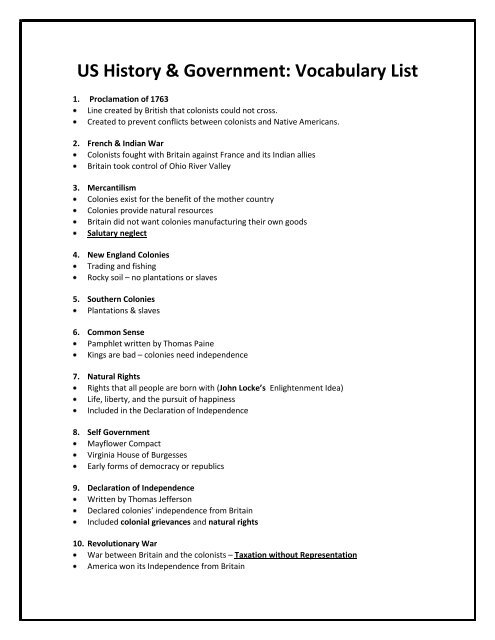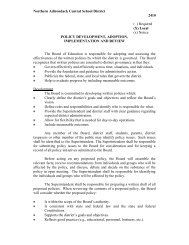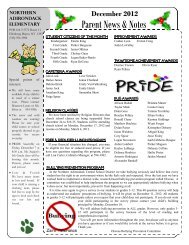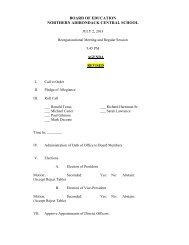US History & Government: Vocabulary List
US History & Government: Vocabulary List
US History & Government: Vocabulary List
You also want an ePaper? Increase the reach of your titles
YUMPU automatically turns print PDFs into web optimized ePapers that Google loves.
<strong>US</strong> <strong>History</strong> & <strong>Government</strong>: <strong>Vocabulary</strong> <strong>List</strong><br />
1. Proclamation of 1763<br />
Line created by British that colonists could not cross.<br />
Created to prevent conflicts between colonists and Native Americans.<br />
2. French & Indian War<br />
Colonists fought with Britain against France and its Indian allies<br />
Britain took control of Ohio River Valley<br />
3. Mercantilism<br />
Colonies exist for the benefit of the mother country<br />
Colonies provide natural resources<br />
Britain did not want colonies manufacturing their own goods<br />
Salutary neglect<br />
4. New England Colonies<br />
Trading and fishing<br />
Rocky soil – no plantations or slaves<br />
5. Southern Colonies<br />
Plantations & slaves<br />
6. Common Sense<br />
Pamphlet written by Thomas Paine<br />
Kings are bad – colonies need independence<br />
7. Natural Rights<br />
Rights that all people are born with (John Locke’s Enlightenment Idea)<br />
Life, liberty, and the pursuit of happiness<br />
Included in the Declaration of Independence<br />
8. Self <strong>Government</strong><br />
Mayflower Compact<br />
Virginia House of Burgesses<br />
Early forms of democracy or republics<br />
9. Declaration of Independence<br />
Written by Thomas Jefferson<br />
Declared colonies’ independence from Britain<br />
Included colonial grievances and natural rights<br />
10. Revolutionary War<br />
War between Britain and the colonists – Taxation without Representation<br />
America won its Independence from Britain
11. Articles of Confederation<br />
First plan for government – (Shay’s Rebellion) failed and replaced by Constitution<br />
National government too weak & State governments too powerful<br />
National government couldn’t collect taxes<br />
Only 1 branch of government – Legislative (Congress)<br />
No President or Supreme Court<br />
1 success was government had a way to allow new states to bet admitted<br />
12. Land Ordinances<br />
Land Ordinance of 1785 & Northwest Ordinance<br />
Set a pattern of development of new territories<br />
Provided guidelines for new states to be admitted<br />
13. Constitution<br />
A written plan for government<br />
Replaced the Articles of Confederation<br />
Gave more power to the national government<br />
14. Ratify<br />
To approve<br />
Constitution had to be ratified (approved) before it could be used<br />
15. Federalist/Antifederalist<br />
First political parties<br />
Federalists – favored a strong national (federal) government<br />
*Supported the Constitution<br />
*Wrote the Federalist Papers to gain support for the Constitution<br />
*Led by Hamilton<br />
Antifederalists – favored strong state governments<br />
*Wanted a Bill of Rights added to the Constitution<br />
*Led by Jefferson<br />
16. Alexander Hamilton<br />
Wanted a National Bank<br />
Had a plan to get rid of the National Debt<br />
Wanted to strengthen America’s economy<br />
17. Cabinet<br />
President’s advisors<br />
Chosen by the President<br />
Example of Unwritten Constitution<br />
Head of national departments (Ex. Secretary of State)
18. Federalism<br />
Power is shared between the states and the national government<br />
Reserved Powers = State Powers<br />
Delegated Powers = National powers<br />
Concurrent Powers = Shared powers<br />
19. Checks & Balances<br />
Ways that each branch of government can control (check) the other 2 branches.<br />
Examples: veto, impeach, appoint justices, approve appointments, approve treaties, laws ruled<br />
unconstitutional<br />
20. Separation of Powers<br />
National government power separated into 3 branches<br />
o Legislative Branch – Congress<br />
o Executive Branch – President – Commander & Chief<br />
o Judicial Branch – Supreme Court<br />
21. Great Compromise<br />
Compromise between New Jersey and Virginia Plans<br />
Created a bicameral (2 house) legislative branch (Congress)<br />
o Senate – 2 for each state<br />
o House of Representatives – based on a state’s population<br />
22. Unwritten Constitution<br />
Parts of our government that are needed but not actually found in the Constitution<br />
Examples: President’s Cabinet, Political Parties, Judicial Review<br />
23. Amendment<br />
An addition or change to the Constitution<br />
“Flexibility”<br />
24. Elastic Clause<br />
Part of the Constitution that allowed for change – synonym of amendment<br />
Allows government to make laws to fit a changing society – Necessary & Proper Clause<br />
Implied Powers<br />
Examples: Louisiana Purchase, FCC, minimum wage, ect.<br />
25. Electoral College<br />
Each state gets electoral votes, same as number of total representatives<br />
Popular vote in each state determines the electoral votes<br />
Criticized because electoral vote doesn’t always reflect popular vote
26. Bill of Rights<br />
1 st 10 amendments<br />
Antifederalists wanted it added<br />
Protects our rights from the government<br />
Examples: Freedom of speech, religion, due process – fair trial<br />
27. Washington’s Farewell<br />
Washington wanted the country to stay neutral<br />
Proclamation of neutrality<br />
<strong>US</strong> was not strong enough to get involved with other countries, might lose new independence<br />
28. Laissez Faire<br />
<strong>Government</strong> should leave businesses alone, keep their nose out of businesses<br />
29. Lobbying<br />
Special interest groups that influence legislatures to get laws passed<br />
Example of unwritten constitution<br />
Lobbyists are criticized for having too much influence on legislatures<br />
30. John Marshall Court<br />
Supreme Court Justice, all decisions led to the power of the national government increasing<br />
31. Marbury v. Madison<br />
Supreme Court case that established judicial review<br />
32. Judicial Review<br />
Power of the Supreme Court to declare laws unconstitutional<br />
Established by Marbury v. Madison<br />
Example of unwritten constitution<br />
33. Louisiana Purchase<br />
Doubled the size of the <strong>US</strong><br />
Bought by Jefferson<br />
<strong>US</strong> farmers gained control of the Mississippi River and New Orleans<br />
34. Embargo Act<br />
Jefferson passed a law that banned trade with all other countries<br />
Helped keep the <strong>US</strong> neutral<br />
Hurt the <strong>US</strong>, was intended to hurt Britain and France<br />
35. War of 1812<br />
War between Britain and the <strong>US</strong><br />
Britain was impressing <strong>US</strong> sailors and arming Native Americans<br />
Francis Scott Key wrote “Star Spangled Banner” about battle of Fort Mchenry
36. Monroe Doctrine<br />
<strong>US</strong> foreign policy that warned Europe to leave Latin America alone<br />
Made the <strong>US</strong> in control of the Western Hemisphere<br />
37. Andrew Jackson<br />
Used the spoils system – gave government jobs to political supporters<br />
Passed Indian Removal Act – Trail of Tears<br />
Nicknamed “King Andrew” (remember the cartoon) *powerful President<br />
38. Manifest Destiny<br />
Americans had the right to settle westward all the way to the Pacific Ocean<br />
39. Abolitionist Movement<br />
Goal was to end slavery<br />
Organized the Underground Railroad (Harriet Tubman)<br />
Frederick Douglas (North Star Newspaper)<br />
William Lloyd Garrison (Liberator Newspaper)<br />
40. Women’s Rights Movement (Women’s Suffrage)<br />
Goal was to get equal rights and suffrage for women<br />
Organized the Seneca Falls Convention and wrote Declaration of Sentiments<br />
Leaders were Elizabeth Cady Stanton, Susan B. Anthony, and Lucretia Mott<br />
41. Uncle Tom’s Cabin<br />
A book written to show how evil slavery was<br />
Used to spread the Abolitionist Movement<br />
Written by Harriet Beecher Stowe<br />
42. Missouri Compromise<br />
Settled a conflict over new states – kept balance between number of free and slave states<br />
Missouri entered the Union as a slave state<br />
Maine entered as a free state<br />
43. Compromise of 1850<br />
Settled a conflict over new states – kept balance between number of free and slave states<br />
Created the Fugitive Slave Law<br />
44. Fugitive Slave Law<br />
Law that allowed slave owners to catch slaves that escaped to the North<br />
Forced slaves to head to Canada for freedom<br />
Angered Northerners who were now forced to be a part of slavery<br />
45. Kansas-Nebraska Act<br />
Allowed new states to use popular sovereignty to decide slavery issue<br />
Bleeding Kansas (John Brown)
46. Popular Sovereignty<br />
New states could vote to decide whether or not they would be a free or a slave state<br />
47. Sectionalism<br />
Loyalty to a part of the country rather than the country as a whole<br />
North vs. South vs. West<br />
Slavery issue increased sectionalism<br />
48. Causes of Civil War<br />
Lincoln was elected – South knew he was against slavery<br />
Sectionalism – North and South were very different places<br />
State’s Rights – Southern states wanted states’ rights (Nullification)<br />
Secession – Lincoln and the North was fighting to preserve the Union<br />
49. The North’s Strengths During the Civil War<br />
More railroads than the South<br />
More factories than the South<br />
Factory production increased<br />
50. Dred Scott v. Sanford<br />
Slaves are property not citizens<br />
Missouri Compromise voided – government can’t prohibit slavery in territories<br />
51. Emancipation Proclamation<br />
Lincoln freed slaves in the Confederacy<br />
Civil War became a fight over ending slavery<br />
52. Reconstruction<br />
Plan to “fix” south after the Civil War<br />
Lincoln’s plan was too lenient on the South<br />
13 th , 14 th , & 15 th Amendments passed<br />
Freedmen’s Bureau helped former slaves<br />
53. Black Codes<br />
Southern laws to limit rights of African Americans<br />
Poll taxes, grandfather clause, literacy tests (prevent African Americans from voting)<br />
54. Jim Crow Laws<br />
Segregation laws in the South<br />
Limited rights of African Americans<br />
55. Plessy v. Ferguson<br />
Supreme court ruled that segregation was legal<br />
Public facilities had to be separate but equal.
56. Gilded Age<br />
Name created by Mark Twain for the end of the 19 th Century<br />
Large gaps between the rich and poor<br />
57. Transcontinental Railroad<br />
Federal government gave railroad companies land to build it<br />
Helped in the settlement of the west<br />
Made transportation cheaper and faster<br />
Led to the downfall of the buffalo and the Plains Indians<br />
58. Monopoly/Trust/Pool<br />
A company that controls or dominates an industry<br />
Worked to eliminate competition to increase profits<br />
59. Social Darwinism<br />
The belief that stronger businesses should be allowed to eliminate weaker businesses<br />
Supporters of social Darwinism also believed in laissez faire and the formation of monopolies<br />
60. Robber Barons<br />
Carnegie, Rockefeller, Morgan, Ford, Vanderbilt<br />
Used ruthless business tactics to eliminate competitors and form monopolies<br />
Philanthropists – donated money<br />
61. Sherman Antitrust Act/Interstate Commerce Act<br />
Laws passed to eliminate trusts/monopolies<br />
Laws showed that the government could regulate/control businesses<br />
Promoted competition in business<br />
62. Labor Union<br />
American Federation of Labor – Samuel Gompers<br />
Organized workers to improve working conditions and increase wages<br />
Easier for skilled workers to unionize<br />
<strong>Government</strong> used force to stop early unions (Pullman Strike & Haymarket Riot)<br />
63. Dawe’s Act<br />
<strong>Government</strong> program to force Native Americans to assimilate<br />
Helped settle the West and achieve manifest destiny<br />
64. Homestead Act<br />
<strong>Government</strong> program that gave land to white settlers<br />
Helped settle the Great Plains<br />
65. Granger Movement<br />
Organization of farmers to help fight against high railroad costs
66. Populist Party<br />
Political party made up of farmers and factory workers<br />
Hoped to achieve an 8 hour work day<br />
Were responsible for direct election of senators and graduated income taxes<br />
Wanted to reform our currency and use a silver standard<br />
67. Pendleton Civil Service Act<br />
This law ended the spoils system<br />
People have to take a civil service test to get government jobs<br />
68. Old Immigrants<br />
Came to America for economic reasons and settled in northern cities<br />
Immigrants from Ireland and Germany<br />
Irish immigrants discriminated against because they were Catholics<br />
69. New Immigrants<br />
Came to America for economic reasons and settled in northern cities<br />
Immigrants from Russia, China, and Japan<br />
Chinese immigrants discriminated against more than other groups<br />
70. Melting Pot Theory<br />
The belief that immigrant cultures blend together to make a new American culture<br />
Immigrants assimilate into American culture<br />
71. Nativists<br />
People that did not want immigrants in America<br />
Formed the Know-Nothing Party to stop immigration<br />
Chinese Exclusion Act and Gentlemen’s Agreement are nativist laws<br />
72. Muckrakers<br />
Journalists that used the press to expose the problems in American society.<br />
Jacob Riis –How the Other Half Lives (Photos of tenements)<br />
Upton Sinclair- The Jungle (Meat Packing Plants)<br />
Ida Tarbell – The <strong>History</strong> of the Standard Oil Company (Corrupt Monopolies)<br />
73. Imperialism<br />
When one country takes over another country<br />
Examples: Spanish American War, Buying Alaska, Taking over Hawaii, Panama Canal<br />
74. Imperialism Policies<br />
Monroe Doctrine – <strong>US</strong> protects Latin America<br />
Roosevelt Corollary – <strong>US</strong> is the Police of Latin America<br />
Big Stick Policy – Speak softly and carry a big stick<br />
Dollar Diplomacy – Use money to control Latin America
75. Spanish American War<br />
Caused by yellow journalism and sinking of the Maine<br />
<strong>US</strong> helped Cuba gain independence from Spain<br />
<strong>US</strong> won Puerto Rico, Guam, and Philippines<br />
76. Yellow Journalism<br />
When journalists exaggerate stories to influence readers’ opinions<br />
Was used to make Americans want war with Spain after the sinking of the Maine<br />
77. Theodore Roosevelt<br />
President that built the Panama Canal and the national parks<br />
Passed Meat Inspection Law<br />
Nicknamed the Trust Buster – ended bad trusts/kept good trusts (Bear Cartoon)<br />
A Progressive that ran for President for the Bull Moose Party<br />
78. Panama Canal<br />
Built by President Roosevelt<br />
Connected the Atlantic and Pacific Oceans to speed up trade<br />
Example of imperialism<br />
79. Progressive Era<br />
Reform period where laws were passed to give people more control of government<br />
Social welfare programs were passed<br />
Examples: Meat Inspection Law, Direct Election of Senators, Referendum.<br />
80. Federal Reserve<br />
A national bank in charge of controlling the supply of money<br />
It also controls the interest rates<br />
81. 19 th Amendment<br />
Law that gave women the right to vote (Women’s Suffrage)<br />
Started with the Seneca Falls Convention<br />
Movement started by Susan B. Anthony and Elizabeth Cady Stanton<br />
82. World War I<br />
The first modern war (The Great War)<br />
Fought in Europe, started by MAIN causes<br />
Militarism<br />
Alliances<br />
Imperialism<br />
Nationalism<br />
83. <strong>US</strong> Joins World War I<br />
Sinking of the Lusitania by German U-Boats<br />
Zimmerman Telegram from Germany asking Mexico to fight the <strong>US</strong>
84. Sedition Act<br />
Law passed during WWI that took away Constitutional rights<br />
Made it illegal to say or print anything negative about the government<br />
85. Wilson’s 14 Points<br />
President Wilson’s plan to prevent further wars in Europe<br />
One of the 14 points was to end the alliance systems<br />
86. League of Nations<br />
President Wilson’s idea for a national peacekeeping organization<br />
Failed because the <strong>US</strong> refused to join<br />
87. Treaty of Versailles<br />
Treaty that ended WWI and led to the start of WWII<br />
Blamed Germany for the war and made the pay war reparations<br />
88. Roaring 20s<br />
<strong>US</strong> economy was great in the 1920s<br />
People can afford to buy more but are saving less than they were before<br />
Flappers, Harlem Renaissance, Red Scare<br />
89. Open Door Policy<br />
Policy that allowed equal trade with China<br />
<strong>US</strong> was afraid that Europe would have an unfair trade advantage with China<br />
90. Great Migration<br />
African Americans migrated to northern cities<br />
Competition for jobs created racial tension and sometimes race riots<br />
91. Teapot Dome Scandal<br />
President Harding’s administration was very corrupt<br />
Oil officials gave bribes to use government land for oil (Teapot Dome, Wyoming)<br />
92. Scopes Trial<br />
A trial against a science teacher that broke a Tennessee law by teaching evolution<br />
It was a conflict between traditional and modern values<br />
93. Red Scare<br />
<strong>US</strong> fear of communism<br />
Led to the violation of Constitutional rights<br />
94. Sacco and Vanzetti Trial<br />
2 immigrants wrongly accused and executed for murder<br />
Convicted because of racists and nativists
95. Temperance Movement<br />
Reform movement to make alcohol illegal<br />
Blamed alcohol for many problems in America<br />
Led to the passage of the 18 th Amendment and prohibition<br />
96. 18 th Amendment (Prohibition)<br />
Made alcohol illegal in the <strong>US</strong><br />
Created organized crime<br />
Bootleggers – made and sold illegal alcohol<br />
Speakeasy – secret illegal bars<br />
97. 21 st Amendment<br />
Made alcohol legal again<br />
Repealed the 18 th Amendment<br />
98. Flappers<br />
Women of the 1920s who wanted to be independent and outgoing<br />
Had short bobbed hair, drank alcohol, and smoked<br />
99. Harlem Renaissance<br />
African Americans artists in Harlem that influenced American culture<br />
Langston Hughes- Poetry<br />
Duke Ellington – Jazz Music<br />
100. Ford’s Assembly Line<br />
Henry ford produced cars faster and cheaper using an assembly line<br />
Allowed the mass production of products<br />
Soon almost all produced were made using an assembly line<br />
101. Schenck v. United States<br />
Supreme Court ruled Espionage Act constitutional<br />
“Clear and present danger” doctrine<br />
Civil rights can be limited for reasons of national security<br />
102. The Great Depression<br />
The day the stock market crashed was called Black Tuesday<br />
Caused by speculation and buying stocks on margin/credit<br />
Caused by overproduction and underconsumption<br />
103. The Dust Bowl<br />
Giant dust storms in the Great Plains area<br />
Caused by poor farming techniques and drought<br />
Farmers moved west to escape the Dust Bowl
104. President Hoover<br />
He was blamed for the Great Depression<br />
Hoovervilles and Hoover Blankets are proof he was blamed<br />
He believed in trickledown economics and giving businesses money<br />
He did not believe in directly helping the people<br />
105. FDR<br />
Created the New Deal to help end the Great Depression<br />
Believed in directly helping the people<br />
106. The New Deal<br />
Programs are alphabet soup (TVA, FDIC, CCC, PWA)<br />
<strong>Government</strong> gained more power and debt increased<br />
Helped unions – passed Wagner Act<br />
<strong>Government</strong> created jobs and controlled businesses<br />
107. Good Neighbor Policy<br />
FDR passed this law to improve relations with Latin America<br />
<strong>US</strong> would no longer intervene in Latin American affairs<br />
108. WWII<br />
Ended the Great Depression<br />
<strong>US</strong> joined after attack on Pearl Harbor<br />
The country mobilized for war<br />
Citizens bought war bonds and planted victory gardens<br />
109. Lend Lease Act<br />
FDR promised to give money to European countries fighting against Germany in WWII<br />
<strong>US</strong> helped the Allies without joining the war<br />
110. Pearl Harbor<br />
Japan secretly attacked <strong>US</strong> navy base at Pearl Harbor, Hawaii<br />
Caused the <strong>US</strong> to join WWII<br />
111. Japanese Internment<br />
Japanese Americans were held out of fear after Pearl Harbor<br />
They lost their homes and jobs<br />
Violated the rights of citizens to protect national security<br />
112. Korematsu v. United States<br />
Court ruled that Japanese Internment was constitutional<br />
Civil liberties may be limited to protect national security<br />
113. Rosie the Riveter<br />
Women that worked in factories during WWII
114. Nuremberg Trials<br />
Nazi leaders were put on trial for war crimes during the Holocaust<br />
It showed that leaders could be held accountable for their actions<br />
115. The Manhattan Project<br />
The secret development of the atomic bomb<br />
President Truman decided to bomb Japan to end WWII<br />
<strong>US</strong> dropped bombs on the cities of Hiroshima and Nagasaki<br />
116. Baby Boom<br />
Large increase in births after the end of WWII<br />
Baby boomers will put strain on the social security system as they retire<br />
117. Suburbs & Interstate Highways<br />
The automobile allowed Americans to live in suburbs<br />
The Interstate Highway Act built better roads and allowed more suburbanization<br />
118. Fair Deal<br />
Truman’s plan to continue FDR’s reforms of the New Deal<br />
Programs that increased government commitment to helping the people<br />
119. The Cold War<br />
The competition and tension between the <strong>US</strong> (Democracy) and the Soviet Union (Communism)<br />
Led to a nuclear arms race and the space race<br />
Korean War and Vietnam War are part of the Cold War<br />
Cold War ends with the fall of the Berlin Wall<br />
120. Containment<br />
<strong>US</strong> policy to stop the spread of communism<br />
Korean War and Vietnam War are fought to contain communism<br />
121. Domino Theory<br />
The belief that if one country falls to communism others will follow<br />
The reason the <strong>US</strong> fought the Vietnam War was to stop the domino theory from happening<br />
122. Truman Doctrine<br />
<strong>US</strong> policy to limit the spread of communism and the Soviet Union<br />
<strong>US</strong> would support countries in need against the spread of communism (containment)<br />
123. Marshall Plan<br />
<strong>US</strong> policy to limit the spread of communism and the Soviet Union<br />
<strong>US</strong> would help the economies of Europe recover after WWII<br />
124. Berlin Airlift<br />
The <strong>US</strong> flew supplies into East Berlin<br />
Helped stop the spread of communism and Soviet expansion
125. NATO<br />
An alliance between the <strong>US</strong> and other countries to stop Soviet expansion<br />
Provided collective security against the Soviet Union<br />
126. Korean War<br />
Fought to protect South Korea from communist North Korea<br />
Fought because of containment<br />
Korea remained divided (38 th parallel) at the end of the war<br />
127. McCarthyism<br />
The witch hunt created by Senator McCarthy for the search of communists in the <strong>US</strong><br />
Trials ruined the reputations of many innocent Americans<br />
Encouraged nativism and violated the rights of citizens because of a fear of communism<br />
128. Rosenberg Case<br />
Couple convicted and executed for being communists and Soviet spies<br />
Showed nativist fears of foreigners<br />
129. Civil Rights Movement<br />
African Americans working to end segregation and get equal rights<br />
Led by Martin Luther King Jr. (“I have a dream” speech)<br />
Rosa Parks treatment led to the Montgomery bus boycott<br />
130. Brown v. Board of Education<br />
Supreme court’s ruling ended segregation in public schools<br />
Reversed the earlier court decision in Plessy v Ferguson<br />
Showed that the national government could overrule state laws<br />
Little Rock 9 were escorted to school by the military<br />
131. Martin Luther King Jr.<br />
Leader of the Civil Rights Movement<br />
Used nonviolent protest and civil disobedience<br />
Led Montgomery bus boycott and march on Washington<br />
Gave famous “I have a dream” speech and was assassinated<br />
132. Communism in Cuba<br />
Led by the dictator Fidel Castro<br />
Cuban Missile Crisis because of Soviets putting missiles in Cuba<br />
Bay of Pigs invasion was Kennedy’s FAILED secret plan to remove Castro<br />
133. Vietnam<br />
Many Americans protested and called it an unjust war<br />
<strong>US</strong> starts war after they are attacked in the Gulf of Tonkin<br />
Fought because of containment to stop the spread of communism
134. Great Society<br />
President Johnson’s programs to help people and end poverty<br />
Programs to improve the general welfare (Medicare & Medicaid)<br />
Programs were abandoned because of the Vietnam War<br />
135. President Nixon<br />
Created the policy of détente to ease tensions with the Soviets<br />
Resigned as President because of the Watergate Affair<br />
New President Gerald Ford pardoned Nixon for any crimes<br />
136. Miranda v. Arizona<br />
Supreme Court case that protected the rights of the accused<br />
“You have the right to remain silent”<br />
137. Roe v. Wade<br />
Supreme Court case that made abortion legal<br />
Protected women’s right to privacy<br />
Controversial case that has been challenged many times<br />
138. President Carter<br />
Major achievement was the Camp David peace accords<br />
Tried to bring peace to the Middle East<br />
Iranian hostage situation made people believe Carter was weak<br />
139. President Clinton<br />
Economy prospered during his presidency giving him high approval ratings<br />
Helped prevent human rights violations in Bosnia<br />
Was impeached for perjury but remained in office<br />
140. President Bush<br />
Defining moment of his presidency was the attack on September 11th<br />
Department of Homeland Security was created because of terrorist attacks<br />
War in Afghanistan against the Taliban started during Bush’s presidency<br />
War in Iraq to remove Saddam Hussein from power






